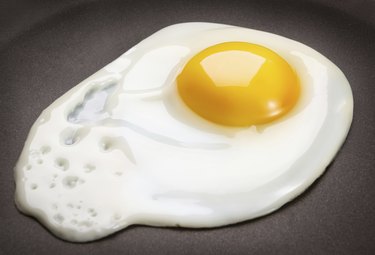
Naturally potassium-rich foods, such as potatoes and bananas, typically contain potassium in the form of potassium citrate. Some supplements and processed foods, however, contain potassium chloride. Both types of potassium may help lower blood pressure, according to a study published in Hypertension in April 2005. Potassium chloride is usually used only in small amounts due to its extremely bitter taste. People with chronic kidney disease should limit foods containing potassium chloride and other sources of potassium. People with Addison's disease, high potassium levels and those on diuretics should also limit potassium chloride.
Dairy and Egg Products
Video of the Day
Potassium chloride's role as a thickener, stabilizer, firming agent and flavor enhancer causes it to be included in many processed foods. These include dairy-based beverages, such as chocolate milk and eggnog, as well as cheeses, any type of cream, condensed milk, powdered milk, yogurt, pudding, spreads made with dairy fat and products made with whey. Processed egg products, including canned or salted eggs and products made with dried eggs, may also contain potassium chloride.
Video of the Day
Grains and Cereals
Read the labels of grain products if you're trying to limit potassium chloride. Although not all grain products include potassium chloride, it is sometimes used in dried or precooked pastas, oatmeal, breakfast cereals, rice or tapioca puddings and processed rice products.
Fruits and Vegetables
Canned tomato products may contain potassium chloride. Other vegetable products that may make use of this additive include fermented vegetables, dried vegetables, canned or bottled vegetables, pureed vegetable products, fried or cooked vegetable products and vegetables canned or bottled in sauces containing soybean sauce, vinegar, brine or oil. Processed fruits can be another source of potassium chloride.
Protein-Rich Foods
Nuts and nut spreads, protein products, canned or fermented seafood, sausage casings, processed meat or poultry and soybeans can all contain potassium chloride. The breading on some meat and poultry products may also be a source of this additive.
Other Foods
Any reduced-sodium food, including some canned soups, may contain potassium chloride -- it is a key ingredient in some salt substitutes. It is also sometimes used to help artificially sweetened jellies and preserves gel. Beverages including coffee, herbal tea, tea, alcoholic beverages and cider can all contain potassium chloride. Other potential sources include artificial sweeteners, condiments, seasonings, broth, sauces, vinegar, mustard, deli salads, yeast and diet foods.
- Center for Science in the Public Interest: Chemical Cuisine
- Harvard Medical School: Potassium Lowers Blood Pressure
- Bornnet Corporation: Product List of Food Additive
- National Kidney Disease Education Program: Potassium
- FAO/WHO Food Standards Codex Alimentarius: Potassium Chloride
- Drugs.com: Potassium Chloride
- Hypertension: Effect of Short-Term Supplementation of Potassium Chloride and Potassium Citrate on Blood Pressure in Hypertensives